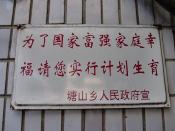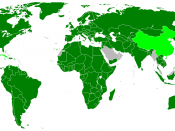Even since the dramatic post-1949 changes in China regarding the role of women, China has remained paternalistic in it's attitudes and social reality. Like many other states, China inescapably has been deeply involved in human rights politics at the international level in recent decades. During this period of time, the Chinese government has been increasingly active in participating in the international human rights regime. China has so far joined seventeen human rights conventions, the U.N. Human Rights Commission, and has expressed its respect for international human rights law. In 1997 China signed the International Covenant on Economic, Social and Cultural Rights, and in 1998 China signed the International Covenant on Civil and Political Rights.
The land reform, which was intended to create a more balanced economic force in marriage, was the beginning of governmental efforts to pacify women, with no real social effect. Communist China needed to address the "woman question".
Since women wanted more equality, and equality is doled out from the hands of those in power, capitalism was examined. The economic issues of repressed Chinese women were focused on the Land Act and the Marriage Act of 1950. The Land reform succeeded in eliminating the extended family's material basis and hence, its potential for posing as a political threat to the regime. Small-plots were redistributed to each family member regardless of age or sex; and land reform provisions stipulated that property would be equally divided in the case of divorce. Nonetheless, their husbands effectively controlled land allotted to women. Patriarchal familial relationships in the Confucian tradition seemed to remain intact. The Marriage Law of 1950 legalized marriage, denounced patriarchal authority in the household and granted both sexes equal rights to file for divorce.
The second and most prominent element of the strategy was integrating women into economic development.


